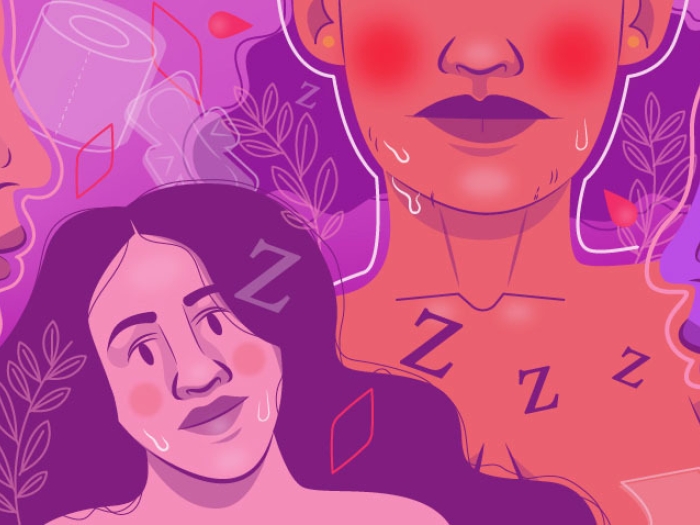A natural sign of aging, menopause can make any woman nervous. Knowing what to expect can help alleviate her concerns, a Michigan Medicine OB-GYN says.
7:00 AM
Author |

The angst that often arises during a woman's puberty may rear its head again when menopause rolls around.
MORE FROM MICHIGAN: Sign up for our weekly newsletter
Much of that emotion could be fueled by uncertainty. Menopause affects each woman differently — symptoms and timing vary by individual.
Knowing the facts about menopause can help make the transition less frightening.
Carrie Bell, M.D., an OB-GYN at the University of Michigan Von Voigtlander Women's Hospital, answered key questions about menopause that all women should know.
What is menopause?
Menopause is a natural biological process in which the menstrual cycle stops. The ovaries are functioning less and no longer releasing eggs, which is related to a drop in estrogen and progesterone levels in the body.
Medically, the designation is confirmed when a year passes without a period or any spotting. "It's a transition in a woman's life," Bell says. "Puberty starts a phase in a person's life in which she will have periods and a biologic family. The transition into menopause is a movement away from that phase of life."
There is no way to prevent menopause, she notes.
The body slowly enters menopause, often with several years of signals preceding it. This is known as perimenopause. Those signals include irregular periods, heavier or lighter flows and weight gain.
The average age for menopause in the United States is 52, according to the Department of Health and Human Services. Perimenopause may begin as early as 10 years prior, but it averages four years before the transition.
Still, some women have a family history of early menopause. Others are ushered into it medically. Women who have their ovaries surgically removed or undergo cancer treatments may experience early menopause. Women who smoke traditionally experience menopause two years earlier than nonsmokers.
In addition, "certain medicines tell the ovaries to not make hormones and tell the brain that you are menopausal," Bell says.
What are the symptoms of menopause?
Before you realize your period has stopped, you may notice other symptoms associated with menopause and perimenopause. They include:
-
Hot flashes
-
Night sweats
-
Low sex drive
-
Dry eyes, skin and mouth
-
Vaginal dryness or pain
-
Emotional changes (irritability, depression and mood swings)
-
Fatigue
-
Urinary trouble (frequency or incontinence)
-
Hair loss
-
Memory problems
Should you see a doctor for menopause?
The range of symptoms, depending on severity, might compel a woman to see a doctor to rule out disease or other ailments. Other patients may hardly notice them.
"Some women transition beautifully into menopause," Bell says. "When a period stops, women feel OK and they don't need a doctor to diagnose menopause."
But women may struggle with symptoms because they interfere with their daily lives. That's when they should consult a gynecologist.
Bell cautions that women younger than 40 who experience symptoms seemingly related to menopause should make a doctor's appointment to rule out any other condition, including primary ovarian insufficiency, which occurs when the ovaries stop producing enough reproductive hormones.
What treatments help menopause?
Treatments vary by symptom, Bell says. Using birth control during perimenopause may eliminate irregularity or heavy flow. It could also improve hot flashes, vaginal dryness and moodiness.
SEE ALSO: 5 Tips for Better Sleep (Counting Sheep Not Required)
Another route to consider is hormonal therapies. Estrogen therapy can reduce hot flashes and improve vaginal dryness. The therapy is available in a pill, cream, gel or patch.
But hormone use warrants a discussion as the impact of using hormones continues to evolve, Bell says. A recent study in the journal Menopause found that the risk of cardiac and stroke death increases in the first year after discontinuing hormone therapy.
"Those who can take hormones are determined on a case-by-case basis," Bell says.
The therapy also can clash with other health conditions. Women should avoid hormone therapy if they have high cholesterol and triglycerides, liver disease, gallbladder disease, blood clots or a family or personal history of breast cancer.
Nonhormonal therapies such as gabapentin and venlafaxine can reduce the symptoms of hot flashes, night sweats and mood changes. And water-based vaginal lubricants may help minimize vaginal dryness.
"A person should talk with her provider if she wants to explore complementary or alternative treatment options for menopausal symptoms," Bell says.
What are the complications of menopause?
Menopause changes the body. The low levels of estrogen and progesterone raise the risk of certain health concerns, including heart disease, stroke and osteoporosis, Bell says.
Women should see a doctor each year not only to monitor for those conditions but also to look at their lifestyle choices — and kick any bad habits.
"When you enter this life phase, hormones and metabolism shift," she says, noting that a healthy lifestyle can ease the transition into menopause. "It's the time to assess individual behaviors like smoking, diet and exercise level, as optimization of these can help with the menopause change."

Explore a variety of health care news & stories by visiting the Health Lab home page for more articles.

Department of Communication at Michigan Medicine
Want top health & research news weekly? Sign up for Health Lab’s newsletters today!





